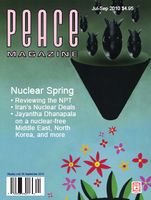
Peace Magazine Jul-Sep 2010, page 30. Some rights reserved.
Search for other articles by Ken#32;Simons here
Edited by Howard Clark. London: Pluto Press, 2009.
The day of the Israeli military’s attack on the Free Gaza Movement flotilla is a sobering time to review a book on nonviolent resistance. Fortunately for us all, the authors of People Power: Unarmed Resistance and Global Solidarity do not shy away from the very real dangers which accompany unarmed interventions.
The emphasis throughout the book is on local actions, carried out by local people. Transnational participants (who embody the “global solidarity” of the book’s subtitle) are expected to remain in the background politically and tactically, although their presence in most cases is recognized as a constraint against the worst excesses of a violent state.
Perhaps the most well-known foreign accompaniment projects are those run by Peace Brigades International in various countries, and by the International Solidarity Movement in Palestine. Their experiences are discussed in individual chapers, as are those of transnational “communities of interest” such as trade unions, the international gay and feminist movements, and conscientious objectors.
The transnational presence does not have to be physical—it can also take the form of media work; solidarity actions in third countries; and skill-sharing through nonviolence training networks. It is encouraging (but not at all surprising—remember Gandhi, after all) to see these skills travel in other directions than from the West to the rest.
Some states, as well as some professional “anti-imperialists,” have argued that nonviolent change movements are driven by foreign funding, particularly US funding, and should be rejected. (States engaged in brutal repression will also play this “national sovereignty” card and, especially since 9/11, are quick to describe foreign and local nonviolent activists as terrorist.) A very cogent chapter by Jorgen Johansen rebuts these arguments, while nevertheless highlighting the need for caution by recipient groups.
In his introduction, editor Howard Clark remains positive about how the process of developing a strategy of unarmed resistance, and the community empowerment which accompanies it, can outweigh the disillusionment of a partial victory (say, Serbia in 2001) or even outright defeat. Formal changes in government—which can be short-lived—are not the primary goal. As anarchists and feminists have argued for decades, it is not just possible, but essential to “change the world without taking power.”
Reviewed by Ken Simons, the managing editor of Peace.

Peace Magazine Jul-Sep 2010, page 30. Some rights reserved.
Search for other articles by Ken#32;Simons here